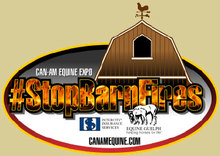A number of tragic barn fires in Ontario recently have initiated discussion surrounding fire prevention and safety on farms.

Stop horse barn fires
Gayle Eckert encourages two key points to reduce fire risks on horse farms; if possible, store all straw and hay in a separate building and check all electricals since horse barns can put more demand on an existing electrical systems.
© 2016 by Equine Guelph
Gayle Ecker, director of Equine Guelph, has been interviewed by a number of media outlets for tips and advice surrounding safety around barns and how to deal with frightened animals in these types of situations. The Centre for the horse owner at the University of Guelph, in partnership with the Ontario Veterinary College, is dedicated to improving the health and well-being of horses.
She encourages two key points to reduce fire risks on farm: if possible, store all straw and hay in a separate building and check all electricals. Horse barns can put more demand on an existing electrical system in barns converted from other uses, with increased lighting, heated water buckets and heated tack rooms.
A fire safety checklist on the Equine Guelph website helps farm owners to check their barns for possible fire hazards.
Ecker encourages farm owners to meet with their local fire prevention officer to walk through their property and look for fire risks.
âTheir role is to help you reduce the risk,â she adds.
Ecker made changes to her own barn after asking a fire prevention officer for assistance. Now all the wiring is in conduits protecting it from moisture and is not enclosed within the walls. She also added more outlets throughout the barn, each with its own breaker switch to reduce extension cords. In addition, she changed the structure of the barn to include a paddock at the back if she needs to move animals to a safe area.
Fire safety is an important topic in a behaviour and safety e-workshop Equine Guelph is offering from February 22 to March 6. The online course allows participants to complete the components when it works for their schedule.
Equine Guelph and Mike King of Intercity Insurance have partnered up at the Can-Am Equine Expo, in Markham in early April, to present a Fire Safety & Prevention initiative. Along with live demonstrations and special guest speakers at Can-Am, there will be two areas available to answer fire safety questions and pick up resource material.
One area will be in the EquiMania! Display and the other will be located within a main Can-Am building, which will be staffed by fire prevention personnel, Intercity Insurance and include information resources from Equine Guelph.
Planning is underway for demonstrations from the local fire department and expert, Robert Webb will be conducting an important lecture on fire safety. As a Retired Chief of Fire Prevention, for Toronto Fire Services and Retired Fire Safety Manager for Woodbine Entertainment Group, Webb possesses over 40 years of experience. Be sure to bring your questions.
The organizations are running a social media campaign on Twitter (https://twitter.com/EquineGuelph) and Facebook (https://www.facebook.com/pages/Equine-Guelph-Helping-Horses-for-Life/182687125075444) focused on reducing fire risks (#stopbarnfires) with information from Bob Webb, Retired Chief of Fire Prevention, Toronto Fire Services and Retired Fire Safety Manager, Woodbine Entertainment Group.
Equine Guelph has provided a training course in animal behaviour, teaching first responders and veterinarians how to move and handle animals and safely rescue them in an emergency situation. The course provided a good foundation and raised awareness with first responders, says Ecker.
They offered the course for two years in a row and hope to continue offering the program as funding becomes available. The course includes three options: a one-day workshop focuses on general awareness, a two-day workshop includes hands-on opportunities and a three-day workshop expands to the operational level and included lectures, demonstrations and hands-on opportunities. Future courses to be held at the Ontario Veterinary College are also under discussion.
Teaching about animal behaviour is so vital, stresses Ecker. Participants learn how to reduce risk for the animals and humans by understanding the animalsâ possible reactions. One of the most important lessons, donât cause more injury to an animal, she adds.
A ârescueâ model horse allows workshop participants an opportunity to apply their newly learned skills to move a horse from a trailer or a ditch. They learn how to protect a horseâs eyes and head, how to sedate a horse safely, and use a glide and strapping to safely move large animals out of harmâs way.
âThis is all about reducing the risk,â says Ecker. âWe focus on prevention.â
Equine Guelph is the horse ownersâ and care giversâ Centre at the University of Guelph. It is a unique partnership dedicated to the health and well-being of horses, supported and overseen by equine industry groups. Equine Guelph is the epicentre for academia, industry and government â for the good of the equine industry as a whole.
Story by: Karen Mantel, Marketing and Communications Officer Ontario Veterinary College (OVC)
